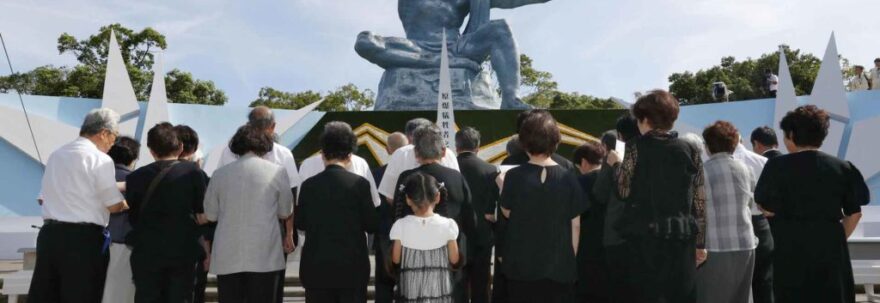Three days after Little Boy was dropped on the city of Hiroshima, the US Army dropped Fat Man on Nagasaki. 77 years have passed since that August 9, 1945. From that date until now, 192,310 names have been inscribed in the cenotaph for the victims.
Nagasaki Memorial Day is observed annually on August 9 in Nagasaki, Japan, commemorating the victims of the atomic bombing during WWII. Nagasaki was the second city after the first bombing three days earlier of the city of Hiroshima. So far, Japan is the only country that suffered nuclear attacks during a war. In 2017, the General Assembly of the United Nations adopted the Prohibition of Nuclear Weapons Treaty, which contains a comprehensive set of prohibitions on participating in any nuclear weapon activities. The treaty commenced on January 22, 2021.
On August 6, 1945, to compel Japan to surrender and end World War II, U.S. bomber Enola Gay dropped Little Boy, the first atomic bomb ever used in a war, on the Japanese city of Hiroshima. The explosion killed an estimated 80,000 people, and thousands more died later because of radiation exposure. The U.S. decided to drop a second bomb to compel Japan to surrender.
On August 9, 1945, three days after the first hit, U.S. bomber Bockscar dropped a bomb called Fat Man on the city of Nagasaki. The bomb contained power equivalent to 22,000 tons of T.N.T. The explosion had devastating consequences on Nagasaki, causing the death of an estimated 40,000 people. More inhabitants died later from burns, radiation sickness, and other injuries. Nagasaki was nestled in narrow valleys between mountains and had a smaller population. After this second bombing, Japanese emperor Hirohito announced his country’s surrender on a radio broadcast on August 15, 1945.
On September 2, 1945, a formal surrender agreement was signed aboard the American battleship U.S.S. “Missouri” anchored in Tokyo Bay, leading to the end of World War II. The two bombings caused the deaths of an estimated 70,000 to 135,000 people in Hiroshima and 60,000 to 80,000 people in Nagasaki. For that reason, Nagasaki Memorial Day is observed to commemorate the bombing victims, promote peace and raise awareness of the importance of avoiding more wars and the destructive potential of nuclear weapons.
Today in Yamaguchi, at the time the atomic bomb fell on Nagasaki, the anti-aircraft alarms and the bells of the Yamaguchi church (St Francis Xavier Memorial Church) have sounded.
The world is one miscalculation away from a devastating nuclear war, a risk not seen since the Cold War, the UN secretary-general has warned. “Until now we have had extraordinary luck,” Antonio Guterres said on Monday.
At a time of rising global tensions, “humanity is just one misunderstanding, one miscalculation, away from nuclear annihilation,” he said.
Guterres offered this reflection at the beginning of a conference of the signatory countries of the Nuclear Non-Proliferation Treaty (NPT).
The agreement was signed in 1968, five years after the Cuban missile crisis, an event often described as the closest the world came to nuclear war. The NPT was designed to stop the spread of nuclear weapons to more countries and move toward the goal of complete nuclear disarmament. Almost every nation on the planet signed the treaty, including the five largest atomic powers.
The UN secretary general considered that the “luck” that the world has had so far to avoid a nuclear catastrophe may not last and urged the international community to join a new drive to eliminate all these weapons.
“Luck is not a strategy. Nor is it a shield against geopolitical tensions that lead to a nuclear conflict,” he said. And he warned that these international tensions are “reaching new heights”, with references to the invasion of Ukraine, tensions on the Korean peninsula and conflicts in the Middle East.
There are an estimated 13,000 atomic weapons in service today in the arsenals of the nine states with nuclear military capabilities, well below the approximately 60,000 in stock in the mid-1980s.
I feel sad that humanity has not learned from the mistakes of the past.



